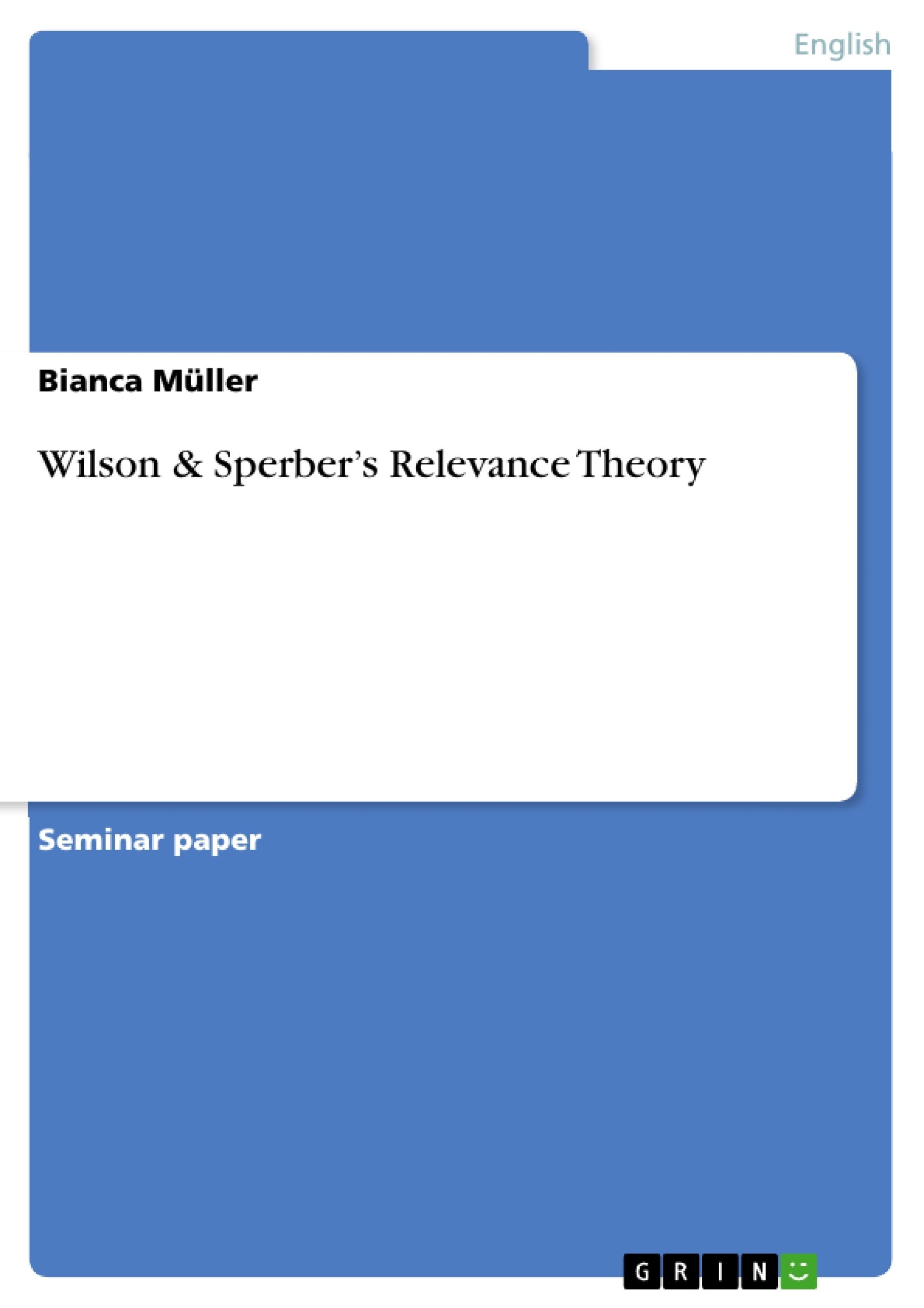The purpose of the present paper is to critically summarize Wilson and Sperber’s book article “Relevance Theory”, published in The handbook of pragmatics.
Inhaltsverzeichnis (Table of Contents)
- 1. Introduction
- 2. Grice's Central Claims
- 3. Wilson & Sperber's Criticism and Assumptions
- 4. Conclusion
- 5. References
Zielsetzung und Themenschwerpunkte (Objectives and Key Themes)
This paper provides a critical summary of Wilson and Sperber's "Relevance Theory," as presented in the "Pragmatics" seminar. The main objective is to analyze their critique of Grice's work and their proposed alternative.
- Grice's Cooperative Principle and Maxims
- Wilson and Sperber's concept of Relevance
- Ostensive-Inferential Communication
- The Cognitive and Communicative Principles of Relevance
- Comparison of Grice's and Wilson & Sperber's theories
Zusammenfassung der Kapitel (Chapter Summaries)
1. Introduction: This introductory chapter sets the stage for the paper, outlining its purpose: to critically examine Wilson and Sperber's Relevance Theory as presented in the "Pragmatics" seminar. It briefly states the aim to summarize the key aspects of their work and its relationship to Grice's earlier theories.
2. Grice's Central Claims: This chapter summarizes Grice's central claims within his theory of communication. It highlights the crucial role of intention recognition in human communication, emphasizing Grice's inferential model where the audience infers meaning based on the evidence provided by the speaker. The chapter also details Grice's Cooperative Principle and its four maxims (Quality, Quantity, Relation, and Manner), explaining how these guide the hearer towards the speaker's intended meaning. The chapter lays the groundwork for understanding the critique presented by Wilson and Sperber in the subsequent chapters.
3. Wilson & Sperber's Criticism and Assumptions: This chapter delves into Wilson and Sperber's critique of Grice's theory. While acknowledging the importance of raising expectations in conversation, they question the necessity of a Cooperative Principle and maxims, the focus on implicit content, the role of maxim violation, and the treatment of figurative language. The chapter then introduces their own concept of relevance, defining it as the ability of an input to connect with background information to yield conclusions that matter to the recipient. It discusses how relevance is a matter of degree, depending on the processing effort and cognitive effect. The chapter introduces the Cognitive Principle of Relevance (human cognition tends to maximize relevance) and the Communicative Principle of Relevance (every ostensive stimulus conveys a presumption of its own optimal relevance), along with the concept of ostensive-inferential communication, which emphasizes the two layers of intention involved in communication (informative and communicative intentions).
Schlüsselwörter (Keywords)
Relevance Theory, Grice, Wilson & Sperber, Cooperative Principle, Maxims, Ostensive-Inferential Communication, Cognitive Principle, Communicative Principle, Pragmatics, Inferential Communication, Cognitive Effect, Processing Effort.
FAQ: A Critical Summary of Wilson and Sperber's Relevance Theory
What is the main purpose of this paper?
This paper provides a critical summary of Wilson and Sperber's "Relevance Theory," focusing on their critique of Grice's work and their proposed alternative. It analyzes key aspects of their theory and its relationship to Grice's earlier theories of communication.
What are the key themes explored in this paper?
The paper explores Grice's Cooperative Principle and Maxims, Wilson and Sperber's concept of Relevance, Ostensive-Inferential Communication, the Cognitive and Communicative Principles of Relevance, and a comparative analysis of Grice's and Wilson & Sperber's theories.
What are the main points of Grice's theory as discussed in the paper?
The paper summarizes Grice's theory, highlighting the role of intention recognition in communication, his inferential model, and the Cooperative Principle with its four maxims (Quality, Quantity, Relation, and Manner). These maxims guide the hearer towards the speaker's intended meaning.
How do Wilson and Sperber critique Grice's theory?
Wilson and Sperber critique Grice's reliance on a Cooperative Principle and maxims, the focus on implicit content, the treatment of maxim violation, and the handling of figurative language. They propose their own concept of relevance as a more comprehensive framework.
What is Wilson and Sperber's concept of Relevance?
Wilson and Sperber define relevance as the ability of an input to connect with background information, yielding conclusions that matter to the recipient. Relevance is a matter of degree, depending on processing effort and cognitive effect. Their theory introduces the Cognitive Principle of Relevance (human cognition maximizes relevance) and the Communicative Principle of Relevance (ostensive stimuli convey a presumption of optimal relevance).
What is Ostensive-Inferential Communication?
Ostensive-inferential communication, central to Relevance Theory, emphasizes the two layers of intention in communication: informative and communicative intentions. The speaker's informative intention is to make the hearer aware of something, and their communicative intention is to make the hearer aware of their informative intention.
What is the difference between Grice's and Wilson & Sperber's theories?
The paper compares Grice's and Wilson & Sperber's theories, contrasting Grice's emphasis on cooperation and maxims with Wilson & Sperber's focus on relevance and cognitive effects. While both acknowledge the inferential nature of communication, Wilson & Sperber offer a more cognitive-based and less rule-based approach.
What are the key chapters and their summaries?
The paper includes an introduction, a chapter summarizing Grice's central claims, a chapter detailing Wilson & Sperber's critique and their theory, and a conclusion. Each chapter summary provides a detailed overview of the content covered.
What are the keywords associated with this paper?
Key terms include Relevance Theory, Grice, Wilson & Sperber, Cooperative Principle, Maxims, Ostensive-Inferential Communication, Cognitive Principle, Communicative Principle, Pragmatics, Inferential Communication, Cognitive Effect, and Processing Effort.
- Quote paper
- Bianca Müller (Author), 2010, Wilson & Sperber’s Relevance Theory , Munich, GRIN Verlag, https://www.grin.com/document/165026




